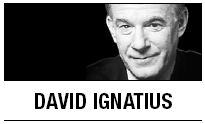CAIRO ― For much of the past 30 years, the shadowy Muslim Brotherhood was almost a raison d’etre for the regime of President Hosni Mubarak: Egypt needed a strong authoritarian regime, the argument went, or it would be hijacked by Islamic radicals. That bugaboo went out the window with Mubarak’s ouster just over a week ago.

It’s easy now, in the afterglow of the revolution that toppled Mubarak, to believe that such warnings were self-serving nonsense. The “Ikhwan,” as the Brotherhood is known here, is out of the closet and doesn’t look so scary. Its young militants have linked arms with secular protesters; its leaders talk of competing with other parties in a democratic Egypt; the movement actually seems to be fracturing a bit, now that it’s out in the sunlight.
The Egyptian people are making a bet that the Brotherhood won’t wreck their new experiment in democracy. But as is always the case with real political change, it’s impossible to be sure. The new Egypt will need a strong constitution to protect human rights, and a strong army to back it up. But even with these checks, there will always be a risk that the country could veer toward a dangerous Islamic radicalism.
To get a sense of the Brotherhood’s power and intentions, I met with several of its leaders and visited a poor Cairo slum where militants might have a foothold. What I found was reassuring. The leaders talk a conciliatory line; more important, they don’t seem menacing out in the streets. Like the rest of Egypt, the Brotherhood’s members seem to be reaching for a more modern identity.
But a caution: The rhetoric of accommodation could change. Abdel Moneim Abou El-Fotouh, one of the group’s more moderate members, warned me that if democracy fails, “silent cells may rise again, and we may suffer again from violence.” He said this jihadist resurgence would be “bad for Egypt and the world,” and he’s certainly right ― but the point is that it’s not an impossibility.
Essam El-Erian, the group’s spokesman, has an office on the banks of Nile with a notice on the door that says: “Muslim Brotherhood.” He’s hardly an underground figure, in other words. His statements are mostly soothing: He says the group won’t run a candidate for president and isn’t seeking a majority in parliament; he predicts that it will probably get between 30 percent and 35 percent of the votes; he says the Brotherhood will abide by Egypt’s international agreements, including the peace treaty with Israel.
El-Erian knows that his world has been changed by the Tahrir Square revolution that shattered its nemesis, the Mubarak regime. The official Brotherhood leadership was actually slow to understand the importance of the protest, and El-Erian sounds a bit defensive in explaining why they were late to the revolution: “We’re busy in other business. To stay and protest in Tahrir is not useful to us.”
The youth members of the Brotherhood got it, however, and they defied their elders and went to Tahrir. The moderate leader Abou El-Fotouh says the kids were right to ignore the leadership. There is a “calcified mind in Egypt,” he says, apparently including some of his colleagues.
Abou El-Fotouh says the Brotherhood should stay out of party politics. Its support would only be 20 percent to 25 percent, he predicts, and he would prefer to form a new party that would be like the ruling AKP in Turkey. This party should even reach out to other sects, he says, recognizing that “Egyptian civilization was built by Muslims and Coptics.”
Listening to these moderate Muslim Brothers, you want to get a reality check out on the streets. A serious investigation would take months, but I was able to visit a poor neighborhood called Ezzbet Khairallah in the hills south of downtown Cairo. This is a shantytown of unpaved streets, without sewage or water, inhabited by squatters who moved from Upper Egypt. The women all wear prim headscarves and robes.
The slum is a breeding ground for Muslim militants, you might think. But my guide, an activist named Yasmina Abou Youssef who runs a neighborhood program here called “Tawasol,” said few people seem connected to the Brotherhood. She introduced me to three veiled women who said the Ikhwan had little influence.
It’s a roll of the dice, creating a fully democratic Egypt where the Muslim Brotherhood could become a dominant force. But from what a visitor can see and hear, it’s a reasonable wager ― and one that deserves American support.
By David Ignatius
David Ignatius’ e-mail address is davidignatius@washpost.com ― Ed.
(Washington Post Writers Group)







![[Today’s K-pop] Blackpink’s Jennie, Lisa invited to Coachella as solo acts](http://res.heraldm.com/phpwas/restmb_idxmake.php?idx=644&simg=/content/image/2024/11/21/20241121050099_0.jpg)
